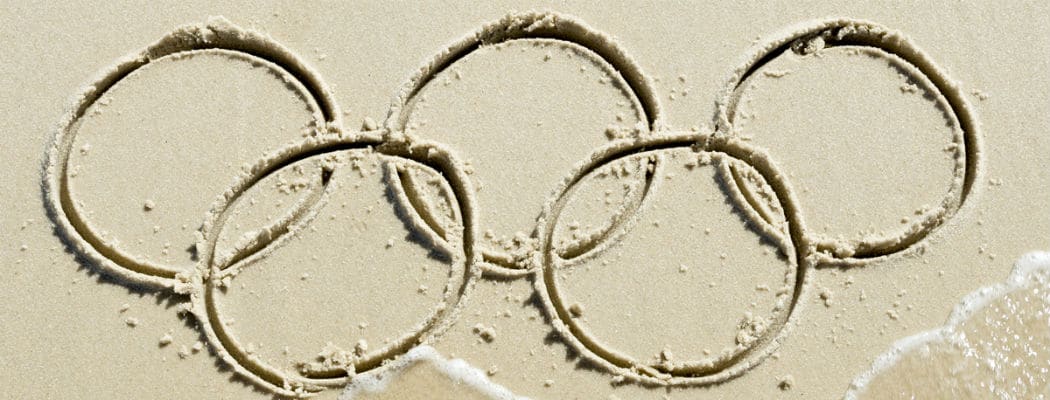Who knew so many Olympians call Nantucket home?
DOROTHY HAMILL
At the age of nineteen, a shy figure skater from Connecticut dazzled the world with her effortless grace, her cute bob haircut and her signature spin, “The Hamill Camel.” Winning gold in the 1976 Winter Olympics in Innsbruck, Austria made Dorothy Hamill a household name, America’s Sweetheart and the future face of figure skating. “[When I competed] it wasn’t about money or fame; the Olympics were the focus,” Hamill says today. “All the other things I was able to do afterwards was a bonus. I never dreamt I would have television specials or commercials.” She never dreamt she’d have a house on Nantucket.
 Nine years ago, Hamill and her husband John purchased a home on Orange Street. Today they split their time between Nantucket and California. Although her days of competitive figure skating are over, Hamill still occasionally takes the ice here on Nantucket. “The quality of the ice here is so smooth, it’s like glass,” she says. “Maybe it’s the quality of the water, but the manager, Bob Pickney, does an amazing job and really cares for it.”
Nine years ago, Hamill and her husband John purchased a home on Orange Street. Today they split their time between Nantucket and California. Although her days of competitive figure skating are over, Hamill still occasionally takes the ice here on Nantucket. “The quality of the ice here is so smooth, it’s like glass,” she says. “Maybe it’s the quality of the water, but the manager, Bob Pickney, does an amazing job and really cares for it.”
Dorothy Hamill has been an inspiration to many, both on and off the ice. Shortly after purchasing her home on the island, she was diagnosed with breast cancer. After beating the disease — she’s been cancer-free for six years — Hamill helped found the national BeWisER+ About Breast Cancer campaign, empowering and educating women around the world. So it is that now, forty years after her gold medal, Dorothy Hamill still continues to shine.
LYMAN PERRY
The son of an All-American guard at the US Naval Academy, Lyman Perry enrolled at his father’s alma mater in 1956 planning on throwing a football, but he ended up rowing an oar instead. Despite being the smallest man in his boat at 6’2”, Perry served as the team’s stroke, rowing at the stern and setting a scorching pace for the seven other rowers. After winning the International Collegiate Regatta, Perry and his team dominated the Olympic trials on Lake Onondaga, besting their opponents by one of the largest margins in trials history. The win propelled them to the summer games in Rome along with the likes of Cassius Clay on the 1960 Olympic Team.
 Marching into that stadium… it’s the thrill of your life to be representing your country,” Perry says today. “When I rowed, it was the height of the Cold War, but we were slapping the backs of Russians and Germans. We had a wonderful time. You never would have known that there were any animosities going on in the world.” Although he and his crew came short of medaling in the Rome Olympics, Perry went on to have a prolific rowing career, competing in over fifteen countries, winning gold in the masters, coaching and starting one of the most famous regattas in the United States called the Head of the Schuylkill.
Marching into that stadium… it’s the thrill of your life to be representing your country,” Perry says today. “When I rowed, it was the height of the Cold War, but we were slapping the backs of Russians and Germans. We had a wonderful time. You never would have known that there were any animosities going on in the world.” Although he and his crew came short of medaling in the Rome Olympics, Perry went on to have a prolific rowing career, competing in over fifteen countries, winning gold in the masters, coaching and starting one of the most famous regattas in the United States called the Head of the Schuylkill.
Beyond the boat, Lyman Perry has spent more than fifty years on Nantucket where he’s designed some two hundred homes and buildings as an award-winning architect. Until last year, he was still launching his shell into Nantucket Harbor for a morning row. “Rowing is a Zen experience,” he says. “But if you rowed like most of us did back then, it’s not as easy as it looks.”
JED DUPREE
It wasn’t until his freshmen year at Columbia University that longtime Nantucket summer resident Jed Dupree decided to take a stab at going to the Olympics. Since the age of six, he had lived his life on the edge of a fencing foil. Everyday after school his mother would drive him two hours from their hometown of Bethlehem, Pennsylvania, to a training facility in New York City to fence under top coaches. By his junior year of college, Dupree was a NCAA Champion, a National Champion and well on his way to the Olympics in Athens. “You spend so long training for this moment and then all of a sudden what was years away is now minutes, seconds away,” Dupree says of competing in the summer games. “You can train forever, but you can’t really prepare yourself for stepping out into the arena to do what you have been imagining for so many years.”
 Although starting the Olympics by winning a massive upset, defeating top-ranked Germany in the first round, Dupree and his team came just four touches short of the bronze medal. “We lost to Russia, but we were proud of coming that far,” he says. “I have nothing but positive feelings for the entire experience.” Dupree returned to the Olympics four years later, this time as a coach to fencing prodigy Race Imboden.
Although starting the Olympics by winning a massive upset, defeating top-ranked Germany in the first round, Dupree and his team came just four touches short of the bronze medal. “We lost to Russia, but we were proud of coming that far,” he says. “I have nothing but positive feelings for the entire experience.” Dupree returned to the Olympics four years later, this time as a coach to fencing prodigy Race Imboden.
Beyond the thrill of competing on the highest stage in sports, Dupree says he was most taken by the international camaraderie of the games. “I was coming across people that I never would have had contact with, a community of people that were super excited to be there and wanted to share their story with you,” he remembers. “After competing I felt more like a citizen of the world than just a representative of the United States.”
AJ MLECZKO
When Nantucket-native AJ Mleczko boarded her flight to Nagano, Japan in the winter of 1998, gold was the only color on her mind. It was the first year that women’s hockey had been played in the history of the games, so Mleczko and her twenty fellow teammates had no idea what to expect. “I remember walking out of this tunnel in Japan, and it was just so overwhelming,” Mleczko says today. “The opening ceremonies was one of the most quintessential Olympic moments. All of team USA, every athlete dressed identically, marching in and representing our country — even just talking about it now gives me chills.”
 Ranked number two behind Canada, the US women’s hockey team went on to dominate the games, in some cases winning by up to ten goals. They defeated Canada twice to claim gold. Returning to the States, Mleczko continued her decorated career in hockey as Harvard’s co-captain. She led the Crimson to a slew of championships and racked up six records, including number one in all-time single season points. Three years later, Mleczko returned to the Olympics and collected a silver medal. She was inducted into the New England Women’s Ice Hockey Hall of Fame in 2002 and then Harvard’s Hall of Fame twelve years later. But of all her awards and recognitions, winning gold is her most treasured.
Ranked number two behind Canada, the US women’s hockey team went on to dominate the games, in some cases winning by up to ten goals. They defeated Canada twice to claim gold. Returning to the States, Mleczko continued her decorated career in hockey as Harvard’s co-captain. She led the Crimson to a slew of championships and racked up six records, including number one in all-time single season points. Three years later, Mleczko returned to the Olympics and collected a silver medal. She was inducted into the New England Women’s Ice Hockey Hall of Fame in 2002 and then Harvard’s Hall of Fame twelve years later. But of all her awards and recognitions, winning gold is her most treasured.
“I’ve been to the last three winter Olympics as a broadcaster, and I think that the Olympic spirit is alive and well,” Mleczko says today. “The Olympics is a sporting event that brings the world together, unlike any other. You can have other sporting events, but they don’t capture the world’s imagination like the Olympics.”
JOHN MISHA PETKEVICH
At the age of two, Misha Petkevich slipped on a pair of skates for the first time. “I was pigeon-toed when I was little,” he explains today, “and my pediatrician put me on skates to help open up my hips.” Growing up in Great Falls, Montana, Petkevich dreamed of becoming a cowboy, not a figure skater — certainly not an Olympian. But a chance encounter with a renowned coach from Canada named Arthur Bourke changed all that. “He saw me skate and said, ‘If you really work hard, I think you could go to the Olympics.’” Four years later, Petkevich did just that. He was seventeen.
 “What was truly remarkable about my first Olympics in 1968 was the camaraderie amongst the athletes from many different countries,” Petkevich remembers. “We’re all reading in the newspapers about conflicts, debates and disagreements on an international basis, but once you got to the Olympics and all the athletes were together, we were all friends, we were all colleagues, we were all comrades.”
“What was truly remarkable about my first Olympics in 1968 was the camaraderie amongst the athletes from many different countries,” Petkevich remembers. “We’re all reading in the newspapers about conflicts, debates and disagreements on an international basis, but once you got to the Olympics and all the athletes were together, we were all friends, we were all colleagues, we were all comrades.”
Petkevich placed sixth and fifth in the 1968 and 1972 Olympics respectively and became one of the most innovative and celebrated skaters of a generation. But that was just the first chapter in his life. After hanging up his blades, Petkevich went on to become a Rhodes Scholar, a fellow in Harvard’s Music Department, a composer in residence at Harvard’s Eliot House, the author of two books, a figure skating television analyst and the founder and CEO of several successful financial companies. Along the way, he and his wife also discovered Nantucket, and today they’ve owned a summer home on the island for more than twenty years.











